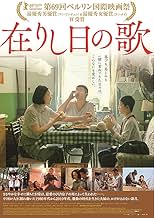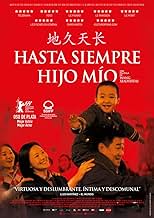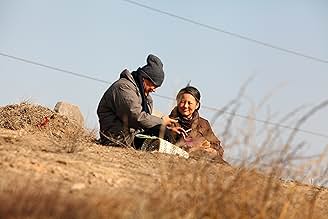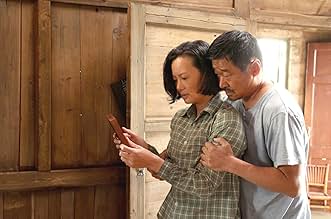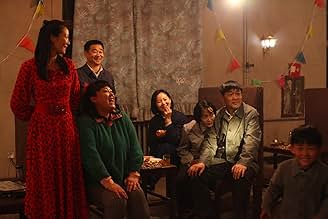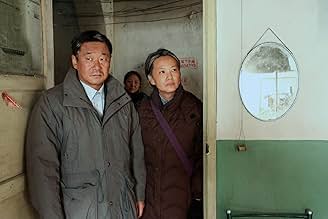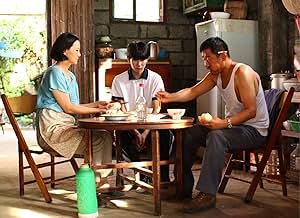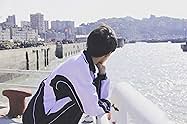Di jiu tian chang
- 2019
- 3 h 5 min
AVALIAÇÃO DA IMDb
7,7/10
5,9 mil
SUA AVALIAÇÃO
Dois casais estão se adaptando às grandes mudanças sociais e econômicas que estão ocorrendo na China dos anos 80 até o presente.Dois casais estão se adaptando às grandes mudanças sociais e econômicas que estão ocorrendo na China dos anos 80 até o presente.Dois casais estão se adaptando às grandes mudanças sociais e econômicas que estão ocorrendo na China dos anos 80 até o presente.
- Direção
- Roteiristas
- Artistas
- Prêmios
- 43 vitórias e 60 indicações no total
Yanguozhang Zhao
- Xinjian Zhang
- (as Yangouzhang Zhao)
- Direção
- Roteiristas
- Elenco e equipe completos
- Produção, bilheteria e muito mais no IMDbPro
Avaliações em destaque
This years we are witnissing something of a "Chinese new wave". "So long my son" was already the third Chinese film I saw this year (after "An elephant sitting still" (2018, Bo Hu) and "Long day's journey into night" (2018, Gan Bi)).
"So long my son" is the perfect sequel to "Lifetimes" (1994, Zhang Yimou). "Lifetimes" covers de period 1940 - 1970 in Chinese history and "So long my son" the period 1980 up till now. In "Lifetimes" the culrurel revolution is the most defining event, in "So long my son" it is the one child policy.
In "Lifetimes" the story is told in chronological order. "So long my son" jumps back and forth in time. Together with the many characters "So long my son" asks from his viewers that they keep paying attention. The one who does so is richly rewarded for this. Moreover the peculiar chronological order is in my opinion less artificial than in for example "Memento" (2000, Christoher Nolan). Some events in the film have such an emotional "gravity" that it is just natural that they disrupt the normal chronological order.
"So long my son" is in some ways critical to Chinese society. Apart from the one child policy and the damage it has done it shows the growing gap between rich and poor. The critisism mainly concerns however policies started by Deng Xiaoping. The widening of the distance between rich and poor is after all an indirect consequence of the open door policy (mixed state ruled and market economy) that was introduced in 1978.
"So long my son" says nothing about the surveillance state that Xi Jinping is building at the moment. Long it was thought that a more market oriented economy would lead by itself to a more liberal political system. This did not happen, and one can call that "The Chinese paradox". Now we have a smaller "Chinese paradox" in the movie industry, where the surveillance state does not preclude the already mentioned Chinese new wave.
"So long my son" is the perfect sequel to "Lifetimes" (1994, Zhang Yimou). "Lifetimes" covers de period 1940 - 1970 in Chinese history and "So long my son" the period 1980 up till now. In "Lifetimes" the culrurel revolution is the most defining event, in "So long my son" it is the one child policy.
In "Lifetimes" the story is told in chronological order. "So long my son" jumps back and forth in time. Together with the many characters "So long my son" asks from his viewers that they keep paying attention. The one who does so is richly rewarded for this. Moreover the peculiar chronological order is in my opinion less artificial than in for example "Memento" (2000, Christoher Nolan). Some events in the film have such an emotional "gravity" that it is just natural that they disrupt the normal chronological order.
"So long my son" is in some ways critical to Chinese society. Apart from the one child policy and the damage it has done it shows the growing gap between rich and poor. The critisism mainly concerns however policies started by Deng Xiaoping. The widening of the distance between rich and poor is after all an indirect consequence of the open door policy (mixed state ruled and market economy) that was introduced in 1978.
"So long my son" says nothing about the surveillance state that Xi Jinping is building at the moment. Long it was thought that a more market oriented economy would lead by itself to a more liberal political system. This did not happen, and one can call that "The Chinese paradox". Now we have a smaller "Chinese paradox" in the movie industry, where the surveillance state does not preclude the already mentioned Chinese new wave.
Set against a background of political and social change in China, it follows the life of the married "Yaojun" (Jingchun Wang) and "Liyun" (Mei Yong). They are contented enough until a tragedy disheartens them thoroughly and they move to a more urban existence which doesn't really suit anyone. It's especially problematic for their adopted son "Liu" (Roy Wang) who takes recalcitrance to an whole new level and just walks out on them one day. Initially concerned for his wellbeing, time elapses and they have to face the immediate difficulties of their own lives - at work and emotionally, before concluding that perhaps they ought to return home. It's a story that constantly moves the stability goalposts for the couple - and though their own love remains steadfast, the pressures put upon them by a society that restricts family numbers then evolves slowly into a market economy that endangers their very livelihood and what prosperity they have worked hard for poses increasing challenges. Eventually, they (and us) begin to realise that perhaps it's grief that is lacking from their life. Grief for their earlier loss(es), for allowing that to fester and inhibit much of the joy of later life - and maybe a resentment of the hand they were dealt by fate. The closing scenes are poignantly reconciliatory and though it looks long on the tin, the slowly developing characterisations are really well presented by two actors who deliver a gently effective chemistry that is palpable - is sometimes exasperating, throughout.
'So Long, My Son' made in 2019 by Xiaoshuai Wang and presented at the Berlin International Film Festival in February 2020 is proof that Chinese cinema is much more diverse and interesting than the mix of historical, martial arts or political propaganda movies that film lovers outside of China know superficially. It is a complex and ambitious film in itself, with a duration of 3 hours of projection, which is the first series of what is planned to become a trilogy that deals with the history of China and the impact of the great transformations that this huge country and its people has gone through in the last 40 years. On many respects the film is sincere and courageous in addressing historical processes and economic and social changes that have been paid for with a huge human price: the policies aimed at restricting families to at most one child per couple, and the transition from planned economy to capitalism market, with dramatic consequences in the lives of millions of Chinese workers who lost their dull but safe employment due to the closure or downsizing of state-owned enterprises, people forced to re-profile and migrate to ensure their livelihoods. The film's size and the ambitions of director Xiaoshuai Wang did not stop him from making a deeply human movie based on a well-written story anchored in China's recent history, with characters that viewers in China and anywhere else in the world can identify with.
We are following the saga of two families from northern China during over three decades, from the ideological relaxation and economic liberalization of the 1980s to the capitalist abundance and socio-economic inequalities of the present. The Liu and Chen families live in the same crowded house, they all work in the same factory, they are neighbors and friends, the two boys of the families were born on the same day and grew up as brothers. The two families symbolically represent different destinies in these times of change. The Liu family remains at the level of simple workers and then small entrepreneurs, they hardly survive the economic shocks that will cause them to migrate to the south of developing China but also a personal tragedy when their only child drowns. The Shen family is more adaptable, earlier the woman reaches a political leadership position, later they succeed economically and make a fortune. Although families break up to reunite only in the end, their destinies remain tied to a secret that cannot be forgotten or erased, perhaps only eventually forgiven.
The two actors who played the roles of the Liu couple impress with the depth, realism and sensitivity of performances. They also convinced the Berlin Festival jury, which awarded them both acting prizes, and I can understand the reasons. The tragedy of losing a child has been represented on screens before, but so far we have not seen such a deep interpretation of the consequences of the demographic policy of the only child at the level of the family cell. Those who see will hardly forget. Director Xiaoshuai Wang alternates the broad takes that describe the complex landscapes of a country in transformation and industrialization, with the intimate ones in the inhabited (but not private) spaces that become familiar to us in all details. Realism alternates with aesthetics and the results are remarkable. The props are chosen carefully, every detail counts. The makeup is perfect. If we pat attention we realize how the director visually expresses messages that he could not make explicit in words. For example, some of the factory-filmed scenes depicting the 1980s include an implicit critique of dullness of life, clothing uniformity and ideological regimentation. The narrative of the film is divided into two parts with different structures, which could belong to different movies. In the first two hours we reconstruct the story of the two families, the conflicts and their evolution in sequences of flashbacks that gradually compose the image and develop the characters. The last hour of the film describes the reunion that takes place in or near contemporaneity, and proposes a reconciliation and a resolution of conflicts. Personally, I liked the first part more, the solution in the end has something too idyllic and too forced which made it look not completely credible. I was left with the impression that Xiaoshuai Wang is a director of great strength and depth who when allowed to develop his artistic and historical vision can lead a movie to admirable results.
We are following the saga of two families from northern China during over three decades, from the ideological relaxation and economic liberalization of the 1980s to the capitalist abundance and socio-economic inequalities of the present. The Liu and Chen families live in the same crowded house, they all work in the same factory, they are neighbors and friends, the two boys of the families were born on the same day and grew up as brothers. The two families symbolically represent different destinies in these times of change. The Liu family remains at the level of simple workers and then small entrepreneurs, they hardly survive the economic shocks that will cause them to migrate to the south of developing China but also a personal tragedy when their only child drowns. The Shen family is more adaptable, earlier the woman reaches a political leadership position, later they succeed economically and make a fortune. Although families break up to reunite only in the end, their destinies remain tied to a secret that cannot be forgotten or erased, perhaps only eventually forgiven.
The two actors who played the roles of the Liu couple impress with the depth, realism and sensitivity of performances. They also convinced the Berlin Festival jury, which awarded them both acting prizes, and I can understand the reasons. The tragedy of losing a child has been represented on screens before, but so far we have not seen such a deep interpretation of the consequences of the demographic policy of the only child at the level of the family cell. Those who see will hardly forget. Director Xiaoshuai Wang alternates the broad takes that describe the complex landscapes of a country in transformation and industrialization, with the intimate ones in the inhabited (but not private) spaces that become familiar to us in all details. Realism alternates with aesthetics and the results are remarkable. The props are chosen carefully, every detail counts. The makeup is perfect. If we pat attention we realize how the director visually expresses messages that he could not make explicit in words. For example, some of the factory-filmed scenes depicting the 1980s include an implicit critique of dullness of life, clothing uniformity and ideological regimentation. The narrative of the film is divided into two parts with different structures, which could belong to different movies. In the first two hours we reconstruct the story of the two families, the conflicts and their evolution in sequences of flashbacks that gradually compose the image and develop the characters. The last hour of the film describes the reunion that takes place in or near contemporaneity, and proposes a reconciliation and a resolution of conflicts. Personally, I liked the first part more, the solution in the end has something too idyllic and too forced which made it look not completely credible. I was left with the impression that Xiaoshuai Wang is a director of great strength and depth who when allowed to develop his artistic and historical vision can lead a movie to admirable results.
In very many ways this film is almost a reboot of Zhang Yimou's film To Live, from 1994, which tells the many trials and tribulations of a family from the founding of the People's Republic in 1949 to the end of the Cultural Revolution in 1976. So Long My Son picks up that chronological baton, and tells a story about family bonds, the meaning of friendship and what constitutes our morals and ethics through the last 30/40 years of Chinese history, from a stilted, materially basic time of 1980 through to the hypermodernity of China in the 2010s.
In the same way To Live aimed thinly disguised critiques at the Chinese government's policies through showing its impact on ordinary people, So Long My Son fires a number of shots too and it's in fact a little surprising to me some of these have been overlooked by the censors. The most obvious of them is the criticism of the one child policy, but hidden in there too are mentions of the privatisation of state owned industries in the early 90s and the mass redundancies that went with them, as well as criticism of the wealth inequality of modern China that has ensued from the market economy transition of the 80s and 90s.
I'm unsure if this was a problem specific to the release version I saw, though I have seen other reviews saying the plot was hard to follow, but I noticed that the English subtitles was often only translating about 1/5 of the dialogue in Mandarin. As a speaker of both, I followed the plot and characters quite easily, but can absolutely understand why many reviewers and comments have said they found the characters and plots hard to distinguish if the subtitling was a problem. However, with one eye on the subtitles, I think the fact they were missing a lot of the Mandarin dialogue would have created a really dreamy plotline that complements well the cinematographic style deployed - long panoramic shots that suddenly cut into a character's perspective; languid sequences that soak in the environment; and shots designed to make the audience feel voyeurs in a private situation.
In the same way To Live aimed thinly disguised critiques at the Chinese government's policies through showing its impact on ordinary people, So Long My Son fires a number of shots too and it's in fact a little surprising to me some of these have been overlooked by the censors. The most obvious of them is the criticism of the one child policy, but hidden in there too are mentions of the privatisation of state owned industries in the early 90s and the mass redundancies that went with them, as well as criticism of the wealth inequality of modern China that has ensued from the market economy transition of the 80s and 90s.
I'm unsure if this was a problem specific to the release version I saw, though I have seen other reviews saying the plot was hard to follow, but I noticed that the English subtitles was often only translating about 1/5 of the dialogue in Mandarin. As a speaker of both, I followed the plot and characters quite easily, but can absolutely understand why many reviewers and comments have said they found the characters and plots hard to distinguish if the subtitling was a problem. However, with one eye on the subtitles, I think the fact they were missing a lot of the Mandarin dialogue would have created a really dreamy plotline that complements well the cinematographic style deployed - long panoramic shots that suddenly cut into a character's perspective; languid sequences that soak in the environment; and shots designed to make the audience feel voyeurs in a private situation.
Saw this at the Berlinale 2019, where it was part of the official Competition. Two prizes were awarded: Silver Bear for Best Actor (Wang Jingchun) and one Silver Bear for Best Actress (Yong Mei). Apart from the acting, it was very interesting to see China transform in thirty years time, albeit that we see only a rural part of China, far away from the big city centers, thus avoiding large scale business and touristic areas.
Showing China while undergoing a drastic change, is one of the main themes of this movie, if not the main one. From a side line we get to see the transformation in progress, going from a communist country towards modern (semi?) capitalism. Factories, workplaces and houses the people work and live in, seem carefully designed to be true to the reality of the times at hand, thereby demonstrating an admirable attention for details.
A perfect example was the factory closure. The gathering with the workers was very illustrative. It showed that such things went in communist times exactly as how it goes nowadays. The workers assembled can protest and find that the director must be sent away. The harsh reality was (of course) in communist times exactly as in our capitalist times. Jobloss overcomes the humble workers, as if it was a natural disaster. There is nothing they can do about it, regardless of all being called "comrades". Neither can help be found in communist textbooks and the principles of "worker's self management".
On the other hand, regarding the implicit second theme, the family related stories of the protagonists, the developments were difficult to follow for me. This was partly due to some unnecessary time jumps and flash backs, partly caused by not telling who-is-who when a new protagonist appears, partly because of me being unable to tell Chinese people apart. Though the story starts with a fatal drowning accident, the people involved will re-unite in the end and will live happily ever after, even when the real truth comes out thirty years later, and even after someone admits having played a dark role in the accident.
It is no problem to sit out the three hours this movie lasts, though not really involving on a human level. And it was certainly not moving or heart-breaking as per what other reviewers wrote. The ground cause for this psychological distance is (see above) the difficulties I had to follow the persons involved, besides the fact that their logic was failing on me a few times.
All in all, I was glad to have seen this movie, regardless of my problems with following the various personal story lines and their interwoven connections. The nearly three hours are easy to sit through, so no problem there. And the ending was a surprise (no details, no spoilers), particularly because it did not cause a hard break in relationships, despite there would have been ample reason for a break-up after admitting a few 30-year-old lies.
Showing China while undergoing a drastic change, is one of the main themes of this movie, if not the main one. From a side line we get to see the transformation in progress, going from a communist country towards modern (semi?) capitalism. Factories, workplaces and houses the people work and live in, seem carefully designed to be true to the reality of the times at hand, thereby demonstrating an admirable attention for details.
A perfect example was the factory closure. The gathering with the workers was very illustrative. It showed that such things went in communist times exactly as how it goes nowadays. The workers assembled can protest and find that the director must be sent away. The harsh reality was (of course) in communist times exactly as in our capitalist times. Jobloss overcomes the humble workers, as if it was a natural disaster. There is nothing they can do about it, regardless of all being called "comrades". Neither can help be found in communist textbooks and the principles of "worker's self management".
On the other hand, regarding the implicit second theme, the family related stories of the protagonists, the developments were difficult to follow for me. This was partly due to some unnecessary time jumps and flash backs, partly caused by not telling who-is-who when a new protagonist appears, partly because of me being unable to tell Chinese people apart. Though the story starts with a fatal drowning accident, the people involved will re-unite in the end and will live happily ever after, even when the real truth comes out thirty years later, and even after someone admits having played a dark role in the accident.
It is no problem to sit out the three hours this movie lasts, though not really involving on a human level. And it was certainly not moving or heart-breaking as per what other reviewers wrote. The ground cause for this psychological distance is (see above) the difficulties I had to follow the persons involved, besides the fact that their logic was failing on me a few times.
All in all, I was glad to have seen this movie, regardless of my problems with following the various personal story lines and their interwoven connections. The nearly three hours are easy to sit through, so no problem there. And the ending was a surprise (no details, no spoilers), particularly because it did not cause a hard break in relationships, despite there would have been ample reason for a break-up after admitting a few 30-year-old lies.
Você sabia?
- CuriosidadesThe film explores the consequences across three decades of China's onetime one-child policy which lasted from 1979-2013.
- Erros de gravaçãoWhen Hao Shen's mother died, he wore a black cloth on his left arm. However, in most areas of China, especially in northern China, it is a folk custom for children to wear a black cloth on their right arm after the death of mother.
- ConexõesReferenced in Estrenos Críticos: Septiembre 2019 (2019)
- Trilhas sonorasAuld Lang Syne
Traditional tune, lyrics by Robert Burns
Principais escolhas
Faça login para avaliar e ver a lista de recomendações personalizadas
- How long is So Long, My Son?Fornecido pela Alexa
Detalhes
Bilheteria
- Faturamento bruto mundial
- US$ 8.096.596
- Tempo de duração3 horas 5 minutos
- Cor
- Proporção
- 1.78 : 1
Contribua para esta página
Sugerir uma alteração ou adicionar conteúdo ausente

Principal brecha
By what name was Di jiu tian chang (2019) officially released in India in English?
Responda
![Assistir a Trailer [OVS]](https://m.media-amazon.com/images/M/MV5BZThlNmFjNjAtNjkwZS00NTU1LWJkM2ItZGIyNmVlZDRmMGM5XkEyXkFqcGdeQXRyYW5zY29kZS13b3JrZmxvdw@@._V1_QL75_UX500_CR0)
